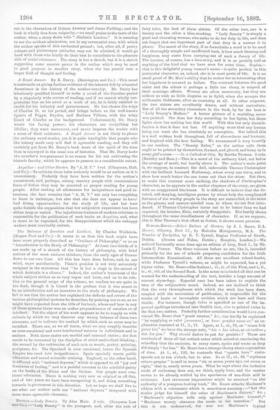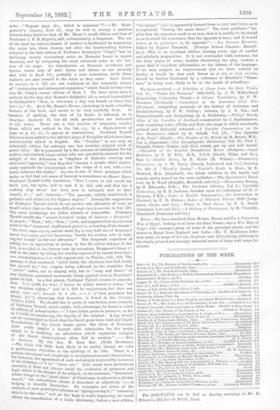Scoon-Booxs.—Ssloct Satires of Horace, by J. I. Beare, B.A. Homer,
Odyssey, Book IX., by Malcolm Montgomery, M.A. The Troades of Euripides, by R. Y. Tyrrell, Regius Professor of Greek,
Dublin. (Brown and Nolan, Dublin ; Simpkin, London.)—We noticed favourably some time ago an edition of Livy, Book I., by Mr. Louis C. Purser. The three volumes before us are, like it, intended primarily for the use of schools preparing candidates for the Irish Intermediate Examinations. All three are excellent school-books, while Professor Tyrrell's volume, as might be expected, has a yet higher value. Mr. Beare edits Satires i., vi., ix. of the First, and i., iv., vi., viii. of the Second Book. In the notes is included all that can be wanted for the understanding of the text, besides a large amount of correct etymology. Especial care has been taken to explain the uses of the subjunctive mood. Indeed, we are inclined to think that the very thoroughness with which the work has been done, coupled with the necessities of publication, is responsible for the marks of haste or incomplete revision which are here and there visible. For instance, though haus is specified as one of the im- proved spellings introduced into Orelli's text, clue is printed twice in the first two satires. Probably further consideration would have con- vinced Mr. Beare that "penis ematur," &c., can hardly be explained " by supplying eo valet [nummus], or hunt praebet mum ut," an ex- planation repeated at II., ii., '71. Again, at I., vi., 71, on " cause. fuit pater his," we have the strange note, " his c his rebus, or virtutibus ; dat. for gen." Why should dative be put for genitive P These are survivals of those all but extinct notes which aimed at convincing the schoolboy that the ancients, in many cases, spoke and wrote as they did simply " for fun," Mr. Beare has a strange theory about expressions of time. At I., vi., 122, he contends that "quarto horn" corre- sponds not to ten o'clock, but to nine. So at II., vi., 40, " septimus octavo propior " is said to mean "six or seven years ago, not seven or eight," that is, nearly seven years. What he says about the inclusive mode of reckoning does not, we think, apply here, and the matter seems to be already settled by the specimens of sun-dials still in existence. Lest erroneous impressions might be received "on the authority of a pompous-looking book," Mr. Beare attacks Macleane's edition with a vehemence which is sometimes amusing :—" Let the reader judge for himself the value of Macleane's dictum," Sco. ; " Macleane's objection tells only against Maoleane himself ;" " Maclean° merely obscures the truth in his assertion." Bat this is not undeserved, for was not Macleane's typical note,—" Ruparti says, &c., which is nonsense "?--Mr. Mont- gomery's Odyssey, Book IX., may be said to occupy a position intermediate between that of Mr. Merry's small edition and that of Professor J. E. B. Mayor's, still, unfortunately, a fragment. The use of the book by various ()lasses of readers is facilitated by separating the notes into three classes, not after the heartrending fashion adopted in the first edition of Professor Kennedy's "Virgil," but by enclosing merely elementary notes on Homeric forms in square brackets, and by relegating the most advanced notes to the bot- tom of the page. An introduction on Homeric accidence and syntax treats only of such forma and idioms as are actually met with in Book IX., probably a wise restriction, while these matters are also treated in the notes as they arise. Such forms as wepowort, in 1. 129, are not explained on the venerable theory of "contraction and subsequent expansion," which found its way even into Mr. Paley's recent edition of Book I. We have never seen it noticed, by the way, that Homer's delightful oU ye IrOAX4 is paralleled in Goldsmith's "Now, in this town a dog was found, as many dogs there be," &c. As in Mr. Boaro's Horace, etymology is made a loading feature of the book, and seems to be very carefully done. In "matters of spelling, the text of La Roche is followed, as in anuAo4s, 13ouAterbP Sr, but all such peculiarities are indicated in the notes. There are a fair number of misprints, besides those which are noticed in the list, e.g., by a displacement of type on p. 15, do, Wo appear as nominative». Professor Tyrrell has once more added to the still few plays of Euripides which have been satisfactorily edited in English. His " Treacles " is not only an admirable edition for ordinary use, but contains original work of great value. Ile is possessed by a duo amount of enthusiasm for his
author, and reminds those critics who are puzzled to account for the delight of tho Athenians in "displays of dialectic cunning and rhetorical ingenuity," that they live "among a people which raptur- ously applauds the introduction on the stage of a cab, with a live
horse between the shafts." So, too, in one of those passages which make us feel that our sense of humour is sometimes an &Scow Siiqnw, Professor Tyrrell boldly translates, "How I crave to roll round my hack, yea, my spine, and to toss it to this side and that (as a rocking ship sways her keel, now to larboard, now to star- board), &c.;" and observes,—" The passage, rightly considered, is pathetic and artistic in the highest degree." Among the suggestions of Professor Tyrrell which do not involve any alteration of text, wo would select that on the very difficult was& elpcfrict Arai-raw, in line 570. The usual renderings are either absurd, or impossible. Professor Tyrrell recalls the "almost technical usage of iplo-cren, = plangere," in Aesch., " Theb.," 855, " Pers.," 1,046, and suggests that elpfcrta must refer to the" measured, rhythmical planctus, or beating of the breast." "So, here, rap& elescris) nacrroir must (by a very bold use of language) mean raph anrpi staarees Ipscraot'arp, beside his mother, who is beat- ing her breast' as the car advances." The desperate expedient of taking &pa as equivalent to amteips in line 98, and to tb+ipov in line 544, is avoided in the former case by accepting Musgrave's 64iv T', and in the latter by taking the word as separated by tmesis from S./sea- way, comparing &eau/sew with cognate ace. in Theocr., xvii., 113. The passage is then rendered, "plied featly the rhythmic foot-fall, featly the jocund lay," the zeugma being softened by the reminder that 4' AeAssii " refers, not to singing only, but to "song and dance," or any rhythmic measured movement, being applied even to Nausicaa's game at ball. In a few places, Professor Tyrrell resorts to emenda- tion. In 1. 1,188, for thrPot r iNE11/0t he prints SihrY0E TE roavai, "all my sleepless nights ;" and in 1. 962 he conjectures, but does not "P?)i' urn: ; Samar S7v d ;.46, x. T. A. (" thou punisbest her whom, &c."), observing that Sticatoikra is found in the Christus Patiens, 2,594. We should like to quote, in conclusion, some remarks of Professor Tyrrell, which might, with advantage, be borne in mind by editors of school-books :—" I have taken pains to preserve, so far arisot h(,, I could, in translating, the dignity of the original. A boy should encouraged to think that the Greek poets were bald and frigid. Translations of the Greek tragic poets like these of Professor Jebb really inspire a learner with admiration for the works w
of
which he yinto Greek master-pieces often fail to awaken." — How An a P"' 13y the Rev. H. Rose Rae. (Relfe Brothers.) welietbink this little book likely to be useful, though we take a Preliminary objection to the spelling of its title. There is certain directness and simplicity in its explanations and illustrations ; instance, the agreement of verb and subject is proved by instances of its violation,--..“ I is, always " "them are." Like manuals, it does not many more pretentious ctys avoid.the confusion of grammar and logic which is the danger of its sub' t •In the sentence, "December, °
which brings us tho `good cheer' e Ben
month," the subordinate clause of Christmas, is otherwise a gloomy
se isdescribed as adjectival, s , .e., as helping to identify December, No examples are given of the analysis of such participial phrases N ses "spring setting in," " assuming this to be the case," and, as the book is worth improving, we would advise the consultation of a Latin dictionary, before a new edition.
" Co-lateral" (sic) is apparently formed from co (sic) and litera, as it is explained, "having the same letter." The term predicate "im- plies that the assertion made is so true, that it is worthy to be stated RO as to avoid the conclusion that the opposite is true; and it is said before, or in preference to, its opposite."—Les Femmes Savantes. Edited by Eugene Fasuacht. (Foreign School Classics : Macmil- lan.)—This is an excellent edition, bearing every sign of careful and scholarly preparation. It is not overloaded with comment, but the forty pages of notes, besides illustrating the play, contain a great deal of excellent information on the history of the language. If we may suggest an improvement (for we have noticed no faults), it would be that such forms as je fai, je croi,
should be further illustrated by a reference to Brachet's "Gram- mar," as being most likely to be in the hands of schoolboys.
We have received :—A Selection of Cams from the State Trials, Vol. II., "Trials for Treason," 1660-108, by J. W. Willis-Band (Cambridge University Press).—A Libyan Vocabulary, by F. W. Newman (Trebner). — Campaigns of the American Civil War (Triibner), comprising accounts of the battles of Antietam and Fredericksburg, by F. W. Palfrey ; Atlanta, by J. D. Cox ; and Chancellorsville and Gettysburg, by A. Doubleday.—Philips' Handy Atlas of the Counties of Scotlandsconstructed by J. Bartholomew, with consulting index (Philip and Son), the maps in which are clearly printed and distinctly coloured.—A Popular Commentary on the New Testament, edited by B. Schaff, Vol. III., " The Epistles of St. Paul" (Clark).—The Peoples of the World, by R. Brown, M.A., Vol. I., illustrated.—The Encyclopaedic Dictionary, Vol. II., Part I. (Cassell, Potter, Galpin, and Co.), neatly got up and well bound. —Chronicle of the English Benedictine Monks (Hodgos).—Legal Medicine, by C. M. Tidy, M.B., F.C.S. (Smith, Elder, and Co.), Part I.—Double Entry, by E. Holah (E. Wilson).—Elementary Decoration, by J. W. Facey (Crosby Lockwood and Co.), forming No. 229 of " Weale's Series."—Tourist's Guide to Essex, by E. Walford, M.A. (Stanford), the latest addition to the handy and concise series issued by the same publisher.—The Sportsman's Hand- book, by R. Ward (Simpkin, Marshall, and Co.).—Elementary Botany, by H. Edmonds, B.Sc. ; The Sunbeam Library, Vol. I.; Vegetable Technology, by B. D. Jaokson, founded upon the collections of G. J. Symons, F.R.S. ; Index to Norfolk Topography ; Art Instruction in England, by F. E. Huline ; Index of Obituary Notices, 1880 (Long- mans, Green, and Co.).—Where to Find Ferns, by F. G. Heath (Sampson Low and Co.).—A.Eistory of Champagne, by H. Vizetelly, illustrated (Sotheran and Co.) Mars.--We have received from Messrs. Bacon and Co. a Panorama Map of Egypt, looking west from the Suez Canal ; also a War Map of Egypt, with enlarged plans of some of the principal places, and the routes to Egypt from England and India.—Mr. T. Ruddiman John- ston sends us maps of Europe, England, and Africa,being additions to his clearly printed and strongly mounted series of large wall maps for schools.































 Previous page
Previous page